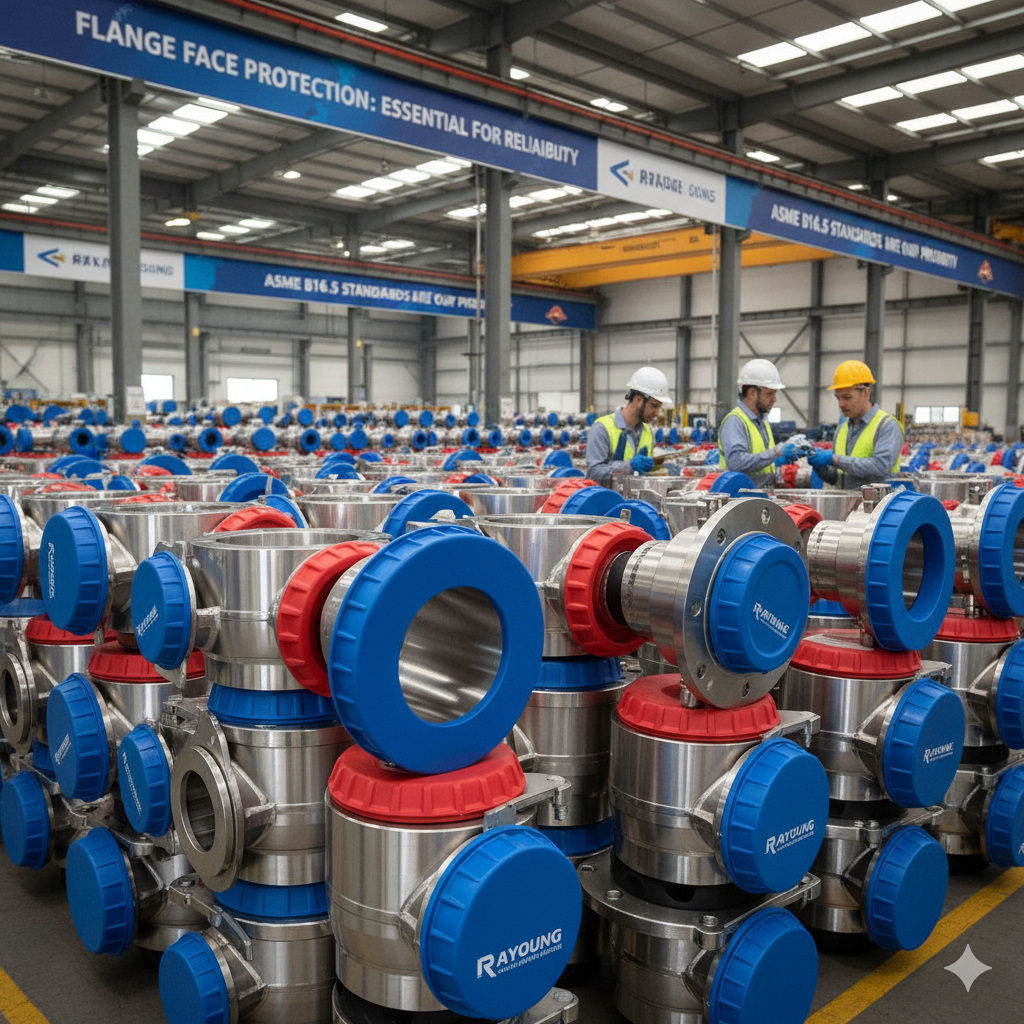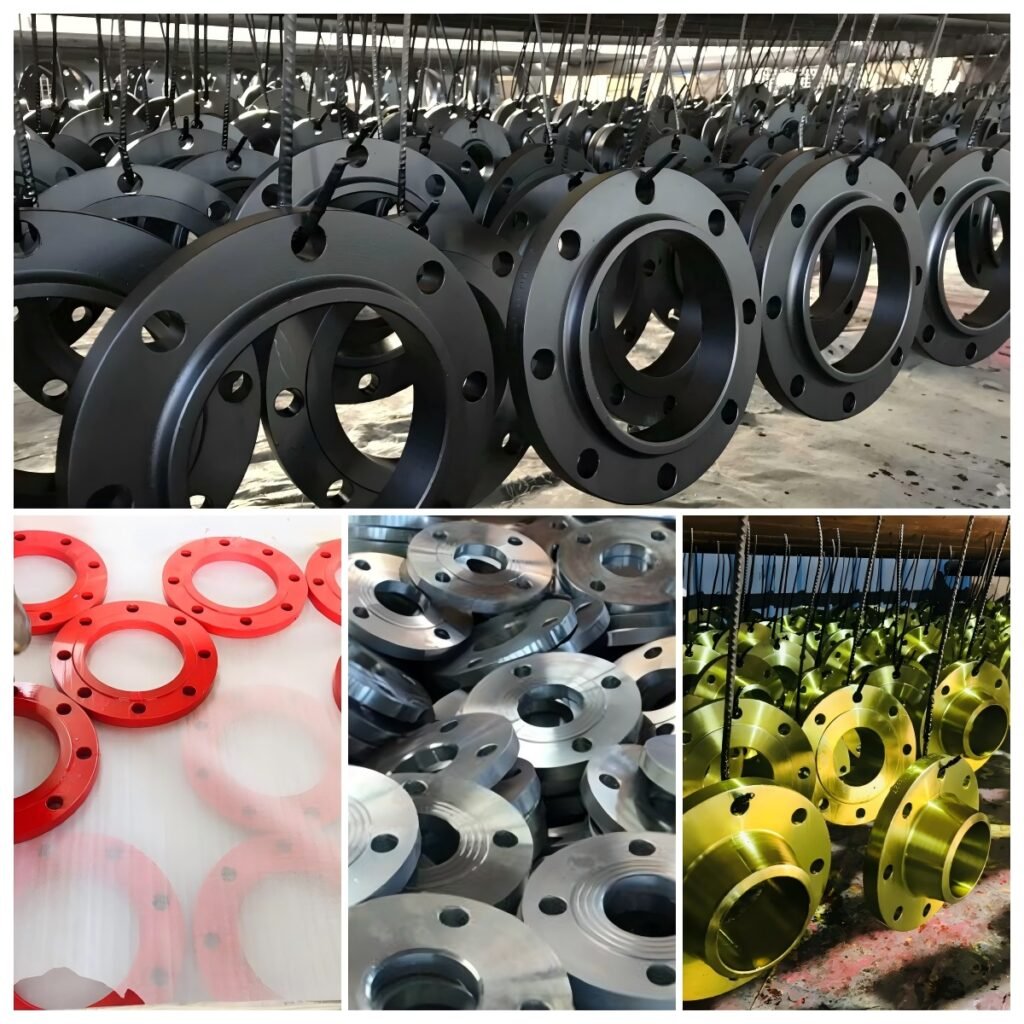Steel Flanges are vital for the piping system. They make sure connections are secure. But flange faces often get hurt. This occurs when they are moved or placed. Flange face protection stops scratches and dents. It also fights rust. These issues can make seals fail.
Rayoung is a trusted industry leader in steel flanges. Protecting the face is key. It is as important as good materials and design. Rayoung makes high-quality flanges.
This blog explains why face protection matters. It discusses what happens if you skip it. It also shows how to protect flanges. This follows ASME rules.

Problems Without Flange Face Protection?
Flange faces are made to be perfect. They need to make a tight seal. Without protection, they get damaged easily. This leads to issues.
- Leaks can happen because of bad surfaces.
- Repairs take time. This means work stops.
- New flanges and gaskets cost more.
- Dangerous liquids can cause safety issues.
Flange Face Rust Risks?
Wetness, chemicals, and harsh places cause rust. Exposed flange faces can rust easily. If they are not protected, the seal gets weak. Then, leaks are more likely. This is a big deal in the oil, gas, chemical, and sea industries.
ASME Rules for Flange Face Protection:
ASME B16.5 says flange face health is very important. The sealing part is the most critical. This rule gives sizes for flanges. It also sets strict limits. These are for surface finish and flatness. This ensures a good gasket seal.
Small flaws can break these rules. Scratches, dents, or rust pits are examples. Such damage can ruin the seal. It makes leaks more likely. This can cause failures during checks or use.
Rayoung is a top industry forged steel flange maker. We make sure all flanges meet ASME rules.
Protect Flange Faces Ways:
There are many ways to protect flange faces.
- Plastic covers are light and cheap. You can use them again.
- Rubber caps are strong. They stop hits and wetness.
- Metal protectors are for tough jobs. They are good for long storage.
- Coatings and sealants stop rust. They are for sea or chemical places.
Picking the Right Protection :
The best choice depends on a few things.
- Where will it be? Inside, outside, or at sea?
- What kind of liquid will it carry?
- How long will it be stored?

Good Things About Flange Face Protection :
Spending money on flange face protection helps in many ways.
- Repair costs go down. You avoid early fixes.
- Flanges and gaskets last longer.
- Safety gets better. Seals are more reliable.
- You meet ASME rules for important jobs.
Real-Life Uses in the industry pipeline system:
Many industries need strong flanges. These include oil and gas, chemicals, water treatment, and power plants. Protecting flange faces at every step is key. This goes from making to putting them in. It lowers accident and downtime risks.
Conclusion
Flange face protection is a must. It is not just an option. Using covers, coatings, or special packing helps. It keeps flange surfaces safe. This ensures rules are met. It also makes things reliable and safe.
Follow ASME rules for flange face protection. Invest in rust prevention. Companies can then have fewer failures. They can also cut costs. Their piping systems will last longer. Rayoung makes strong and precise products. They also add protection. This matches industry rules.
Need good flange solutions? Check Rayoung’s forged steel flanges. They are strong and reliable. Or, ask for a price today. Find the right solution for your project.
+86-18003119682
info@hb-steel.com
Main Points
- Flange face protection stops leaks, rust, and costly stops.
- ASME rules need perfect flange faces. Damage can break rules.
- Work with a good maker like Rayoung. This means long-lasting and compliant products.
FAQs
Q1: What is flange face protection?
A1: It means using covers or coatings. These keep the sealing part of a flange safe. They stop damage, rust, or dirt.
Q2: Why is flange face protection important?
A2: It stops leaks. It makes flanges last longer. It ensures ASME rule following. It helps keep operations safe.
Q3: What are ASME rules for flange face protection?
A3: ASME B16.5 lists limits for flatness and finish. Scratches, dents, or rust can make a flange not meet rules.
Q4: How can I stop flange face rust?
A4: Use protective caps. Put on anti-rust coatings. Store flanges in dry places. For long jobs, consider stainless steel flanges. They offer more protection.
Q5: What industries benefit most from flange face protection?
A5: Oil & gas, chemicals, power, marine, and water treatment industries all need it. It keeps their work safe and leak-free.

